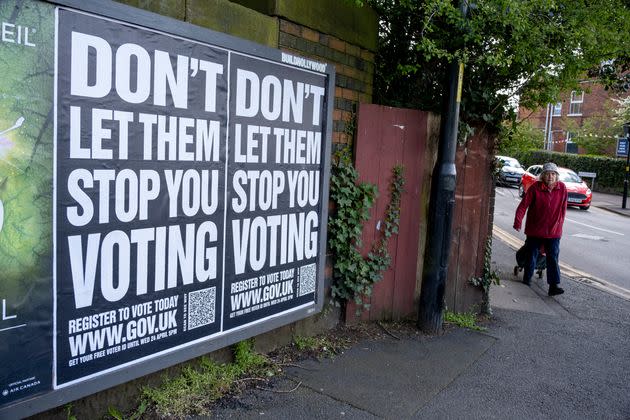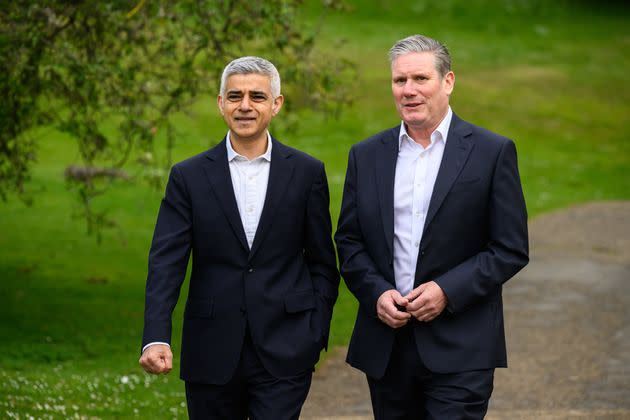This Is What's At Stake In These Local Elections – For Westminster And Us

Voters across England and Wales will be heading to the ballot box on Thursday to take part in the local elections.
More than 2,600 seats are up for grabs, meaning the day could end up have a significant impact on Westminster.
However, voter turnout is usually pretty low for the local elections.
So here’s what you need to know – and why it’s important to vote, if you can.
How many places are going to the polls?
While there are no local council elections in Scotland and Wales, seats in 107 English councils – 31 metropolitan boroughs, 18 unitary councils and 58 district councils – are to be contested.
There will also be 10 mayoral elections, including in London. Three of these positions are newly created, and their election will use the first-past-the-post system.
Eyes will be the capital’s incumbent mayor Sadiq Khan, who is seeking a third term against the Tory candidate Susan Hall, as well as Tory mayors – Tees Valley’s Ben Houchen and West Midlands’ Andy Street.
There are also 25 seats available in the London Assembly, while police and crime commissioners are also being elected across England and Wales.
As if that’s not enough, a by-election will be held in Blackpool South after the Tory MP Scott Benton was caught in a lobbying sting.
This works out to a total of 2,636 seats being contested on Thursday.
That’s actually the smallest number of any local electoral cycle – just one sixth of the total number of council seats in England.
Out of the main parties, the Conservatives are defending 985 seats, Labour defending 965, the Liberal Democrats 410 and the Green Party 107.

Why are the local elections important for Westminster?
The local elections do not have any direct impact on the number of seats each party has in parliament, and only a relatively small number of seats are up for grabs.
However, it’s a good way to understand how the public feel about the political parties at the moment.
For instance, in 1996, New Labour swept through the local elections shortly before their landslide victory in 1997.
This week’s elections are expected to serve up a similarly devastating blow to the Tories, further dampening morale ahead of the general election late this year.
Many of the seats being contested this time were last up for election in 2021 – a time when Boris Johnson’s rollout of the Covid vaccine saw the Tories take home their best performance in the local elections since 2008.
Predictions for the Tories ahead of these local elections are significantly less favourable, as Sunak is still struggling to deliver on his five pledges for 2023 and overcoming the cost of living crisis.
The Tories may even try to use a landslide defeat to oust the PM, while Starmer’s party would use a strong performance as proof a strong win at the general election is very much on the cards.
Why does it matter for you?
Local councils have a direct impact on your area. That means any issues with rubbish collection, street maintenance, community facilities, housing, homelessness, schools and transport, all come down to your local councils.
As Professor Tony Travers from the London School of Economics told The Big Issue in 2021: “Almost everything you see, as you walk around the streets, as you leave your home and walk around, is in the hands of the council.
“It’s hard to exaggerate.”
But voter turnout is often low, because the impact of these elections tends to be overshadowed by any wider turbulence in Westminster.
According to the Institute for Government, only around 30 to 40% of the electorate vote in local elections – far lower than the average 66% turnout we’ve seen at the last five general elections.
What do pundits expect to happen in these local elections?
Pundits – and opinion polls – expect the results to go the same way as many of the other elections under Sunak’s premiership.
After all, the Tories have won just one of the 12 by-elections which have taken place during Sunak’s time in office – and that was for Johnson’s old seat, Uxbridge and South Ruislip.
According to analysis from Sky News, the Conservatives will lose around 500 seats, which is half of their total number of councillors facing election.
Labour could make a gain of 350, while the Lib Dems could gain around 150.

